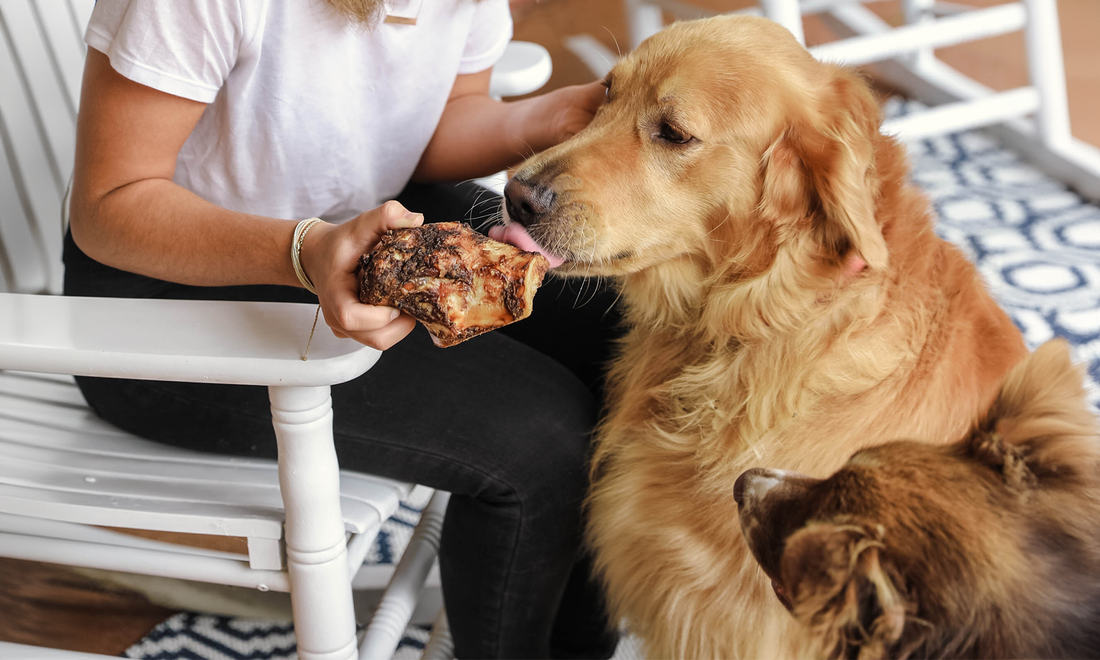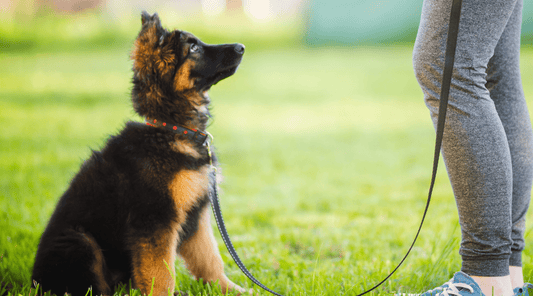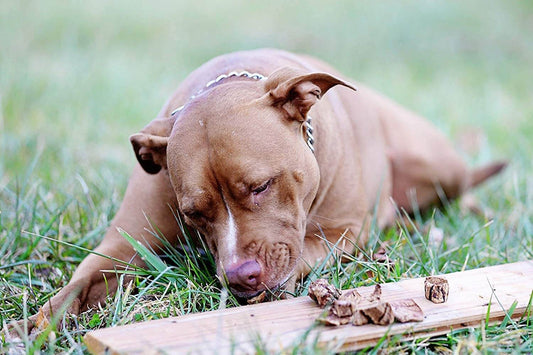What’s The Safest Bone For Aggressive Chewers?
Dawn Miller Aug 17, 20245 Minute ReadYesterday, while watching my 3 dogs romp in our fenced backyard, I started as my terrier, Pixie, yelped. Then I saw my girl running toward me to find some safety. As much as she loves to play, she had had enough. My large dog, Bruno, is a gentle giant. But he also has a strong jaw, and sometimes he doesn't recognize his own strength.
Case in point, he tears through some dog bones in seconds. Most become unsafe quickly with sharp edges and pieces my dogs could swallow. I had to search until I found dog chew bones that would last. So, I started asking: What’s the safest bone for aggressive chewers?
I found several that I can't recommend and one dog bone that I would suggest to anyone with an aggressive chewer.

1. It's Not Rawhide
Rawhide chews are everywhere. But they may not be the best option for aggressive chewers or any dog, for that matter. They have some clear issues:
- Choking Hazard - Rawhide can break into large pieces, posing a significant choking risk.
- Digestive Issues - Some dogs may have trouble digesting rawhide, leading to potential blockages.
- Chemical Processing - Rawhide is often processed with chemicals that can be harmful to your dog's health.
- No Real Nutrition - Rawhide generally lacks significant nutritional value, containing minimal protein and fiber.
Rawhide bones are intended to break apart. But aggressive chewers destroy them before they get many of the teeth and gum benefits.
If you'd like to skip the unsafe bones and see the best dog bone for aggressive chewers, it's here.
2. It's Not Synthetic Dog Bones
Synthetic bones are usually made of materials like nylon, rubber, or plastic. Sometimes, manufacturers enrich synthetic bones with vitamins, minerals, and dental health additives to enhance their nutritional value and benefits. But, just like a multivitamin can't replace a healthy diet, this isn't the ideal I strive for.
- Artificial Ingredients - Synthetic chews often contain artificial flavors, colors, and chemicals that aren't great for your dog's health.
- Durability Issues - While some synthetic chews are durable, others can break into pieces that pose choking hazards or can be ingested, leading to digestive issues.
- Lack of Nutritional Value - Unlike natural bones, synthetic chews don't provide any nutritional benefits unless they're added. So, dogs are missing out on the essential nutrients found in natural options.
Plus, aggressive chewers can chew off and swallow whole pieces. I don't think rubber, microplastics, and nylon should be part of a dog's regular diet.
3. Not Wood Pulp Dog Bones
Now, I will give this type of dog bone props because it uses natural material that does the least harm. Dogs sometimes chew on sticks in nature. Sticks are the original fetching toy. But veterinarians generally recommend that dogs not gnaw on them. They can be damaging to teeth. Plus, an aggressive chewer will splinter them quickly, making them unsafe. These aren't a safe substitute for safe dog bones for aggressive chewers. So, to sum things up:
- May Splinter - Especially with aggressive chewers
- No Nutrition - Wood pulp (cellulose) has no nutritional value. It's used as a filler in some human products, like grated cheese.
So they're not the safest dog bones for aggressive chewers. But they're not the worst, either.
4. Not Raw Dog Bones
I promise we're getting closer. These are beef marrow bones. And marrow bones for dogs are something that dogs consume in the wild. They have a lot of nutrition plus the dental benefits. Still, I had some concerns with these, especially as dogs chew bones for aggressive chewers.
Those are:
- Bacterial Contamination - Raw bones can harbor harmful bacteria like Salmonella or E. coli, posing health risks to both dogs and humans. This would be an outside-only dog bone if I gave my dogs these. I don't want them dragging what is basically a raw steak around my home. And even if my dogs stay in a designated area, they will lick me and my kids.
- Choking and Splintering - Raw bones can splinter or break into pieces, leading to choking hazards and potential injuries to your dog’s mouth, throat, or intestines.
- Digestive Issues - Raw bones can be tough on a dog’s digestive system, potentially causing blockages or other gastrointestinal problems.
I had to keep looking to find the safest bone.
5. Not Cooked Bones
Cooked marrow bones can cause similar problems. If they're cooked too long or at too high a temperature, they become brittle. If you boil bone broth bones at home, please don't give them to your dog.
Not long enough, and the bone is too hard and can damage teeth.
Too long, they become soft. These are not safe dog bones for aggressive chewers...or any of my dogs.
But there's a big but here!
Cooked beef marrow bones can be safe and nutritious when properly prepared. I never try to do this myself. Professionals have the right equipment and can test bone safety.
So, let's dig a little deeper into this topic to discover the truth.
6. It's Not Beef Marrow Bones for Conventionally-Raised Herds
So, what's my BEEF with these marrow bones for dogs? These are definitely better than some of the options on this list. They are generally safe for aggressive chewers when cooked properly by a professional.
I'm not a picky person. I promise. But I'll be the first to admit I do have some high standards when it comes to three things: my family, our health, and animal welfare. Conventionally-raised beef marrow bones impact all 3 of these. My dogs are my furry kids, after all.
- Factory Farming - Conventionally-raised cattle are confined in muddy, overcrowded pens for most of their lives. They are fed an all-grain diet, which isn't natural. As a meat-eater, I try to avoid cattle raised in this way.
- Higher Saturated Fat - A beef marrow bone from conventionally raised cattle is also higher in saturated fat and lower in health-promoting fats like Omega 3 and Conjugated Linoleic Acid (CLA). I'm not talking about an itt-bitty difference here. Grass-fed has 6X the omega 3 and 2X the CLA.
- Worse Overall Nutrition Profile - Grass fed has more protein, more iron, less overall fat, and more of several vitamins and minerals.
So...
What Is the Safest Bone for Aggressive Chewers?
After trying just about every kind of chew out there, I've landed on one clear winner: properly prepared grass-fed marrow bones for dogs. These are the only dog bones I feel truly good about giving to my pack—and that actually last. Here’s why:
- All-Natural - No preservatives, no additives, no sketchy stuff.
- Right Density - Tough enough to stand up to power chewers like Bruno, but not so hard they risk breaking a tooth.
- Better Nutrition - Naturally packed with lots of collagen, glucosamine, chondroitin, healthy fats, vitamins and minerals
- Slow-Cooked Professionally - Made at low temperatures to lock in nutrients and avoid brittleness that leads to splintering.
- Supports Dental Health - Chewing helps reduce plaque and tartar while massaging gums.
- Support Mental Health - Gnawing is an instinctual behavior that promotes a sense of safety and well-being for dogs.
Need I say more? Grass fed marrow bones for dogs are my go-to choice for safe and satisfying dog chew bones.
But let’s be real—not all dogs are built the same. What’s safe and satisfying for a 10-pound terrier might be downright dangerous for a 90-pound lab. So here’s what I’ve learned from testing out different marrow bones on my own pack of wild things:
Best Marrow Bones by Dog Size
Small Dogs (up to 15 lbs):

Go with small femur slices or kneecaps. These give enough chew time without overwhelming their jaws.
Pixie, my terrier, loves these single-ingredient small bones from K9 Connoisseur. They’re the perfect size for her to hold steady with her paws, and they don’t splinter.
Medium Dogs (16–50 lbs):

Try a medium center-cut marrow bone. Not too thick, not too soft. These give that Goldilocks chew experience - one that's just right.
This bone from K9 Connoisseur is my go-to for my mid-sized pup. It holds up well to repeated gnawing, and he can work on one for a good hour.
Large Dogs (50+ lbs):

Big boys like Bruno need the large knuckle or shank bones. These are built for power chewers.
These large marrow bones are the only ones I’ve found that can keep up with him. The right density keeps them from splintering, and there’s enough bone to last more than one chew session—even with his monster jaw.
No matter the size, always supervise your dog when they're chewing, and when the bone starts looking worn down or too small to be safe, toss it. Safety first—fun second.
Available On:
Disclosure: This article may contain affiliate links, which means we may earn a small commission if you make a purchase through these links—at no extra cost to you. We only recommend products we trust and believe will benefit you and your K9.






